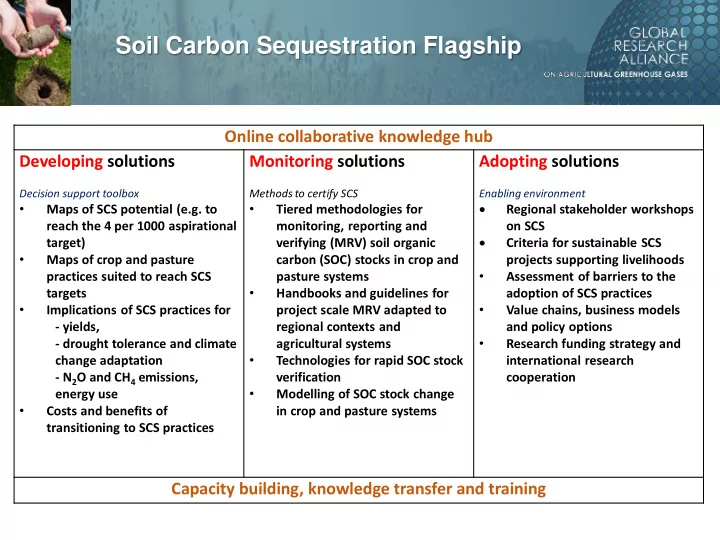

Soil Carbon Sequestration Flagship Online collaborative knowledge hub Developing solutions Monitoring solutions Adopting solutions Decision support toolbox Methods to certify SCS Enabling environment • • Maps of SCS potential (e.g. to Tiered methodologies for Regional stakeholder workshops reach the 4 per 1000 aspirational monitoring, reporting and on SCS target) verifying (MRV) soil organic Criteria for sustainable SCS • Maps of crop and pasture carbon (SOC) stocks in crop and projects supporting livelihoods • practices suited to reach SCS pasture systems Assessment of barriers to the • targets Handbooks and guidelines for adoption of SCS practices • • Implications of SCS practices for project scale MRV adapted to Value chains, business models - yields, regional contexts and and policy options • - drought tolerance and climate agricultural systems Research funding strategy and • change adaptation Technologies for rapid SOC stock international research - N 2 O and CH 4 emissions, verification cooperation • energy use Modelling of SOC stock change • Costs and benefits of in crop and pasture systems transitioning to SCS practices Capacity building, knowledge transfer and training
Soil Carbon Sequestration flagship Contributions received Developing solutions Monitoring solutions Adopting solutions Decision support toolbox Methods to certify SCS Enabling environment • • Argentina : SCS tool and • Argentina : Sugarcane and France : identifying barriers to Pasture beef systems databases adoption in the national • • Australia : monitor changes in soil Brazil : C sequestration assessment of SCS • strategies in agriculture across carbon stocks (similar to Australian Spain : studies on barriers to biomes: low Carbon Emission Emissions Reduction Fund) adoption • Brazil : MRV for SCS in grain Agriculture Plan of Brazil • France : national assessment of production systems • France : Digital soil map solutions and implications of SCS in agriculture development • • Ireland : national soil survey and Lithuania : stabilization and enhancement of SOC to soil in soil carbon assessment in grasslands or arable land grasslands • • Spain : carbon stability and New-Zealand and Ireland : full inversion tillage in grasslands modeling studies, especially with • USA: funding international degraded marginal land • USA. International soil carbon collaborations on soil health, reactive N and microbial network and database hosted by communities Fluxnet • EU : ERAGAS (PEATWISE, SCS drained peatlands; GHG- MANAGE, SCS in landscapes)
Soil Carbon Sequestration flagship 2017-2019 Developing solutions Adopting solutions Monitoring solutions Decision support toolbox Methods to certify SCS Enabling environment • • Argentina, Australia , Brazil, • Argentina , Australia, Brazil, France, Spain (+ other France, Ireland, Lithuania, France, Ireland, Spain, USA, EU - countries?) New-Zealand, USA (+ other ERAGAS (+ other countries?) countries?) REGIONAL PROJECTS REGIONAL PROJECTS PROJECT 3 (e.g. 2 post-docs or researchers (e.g. 2 post-docs/researchers + (resources from CIRCASA) by region, supported by SCS multi-author SCS team) teams) • • Regional maps of crop and Handbooks and guidelines for Regional stakeholder pasture practices suited to project scale MRV adapted to workshops on SCS regional contexts and Criteria for sustainable SCS reach SCS targets agricultural systems projects supporting • Regional implications of SCS livelihoods • practices for Modelling & remote sensing methods for SOC stock change - yields, - drought tolerance and in crop and pasture systems climate change adaptation - N 2 O and CH 4 emissions, energy use CIRCASA: a funded Coordination and Support Action
CIRCASA Coordination of International Research Cooperation on soil CArbon Sequestration in Agriculture
Goals of CIRCASA project The overarching goal of CIRCASA is to develop international synergies concerning research and knowledge transfer on agricultural soil C sequestration at European Union (EU) and global levels. • Strengthen the international research community on soil carbon sequestration in relation to climate change and food security; • Improve our understanding of agricultural soil carbon sequestration and its potential for climate change mitigation and adaptation and for increasing food production; • Co-design a strategic research agenda with stakeholders on soil carbon sequestration in agriculture; • Create an International Research Consortium
Countries of the 24 CIRCASA partners Additional research sites
CIRCASA partnership CIRCASA benefits from the participation of: • The Global Research Alliance on agricultural greenhouse gases (GRA, 47 member countries), • The 4 per 1000 - Soils for Food Security and Climate - initiative (33 member countries), • The Joint Programming Initiative on Sustainable Agriculture, Food Security and Climate Change ( FACCE-JPI , 22 member countries), • In addition, CIRCASA will also benefit from the contribution of the Climate Change Agriculture and Food Security program (CCAFS) and the Water, Land and Ecosystems (WLE) programs of the CGIAR, • And collaborate with the Intergovernmental Technical Panel on Soils (ITPS) of the Global Soil Partnership (GSP)
Online collaborative research platform
SCS Flagship: substantial opportunities for countries investments What you can expect? • Research organizations : be part of a large collaborative research effort (facilitated by the online collaborative platform); contribute to the International Research Consortium (IRC) • Research agencies: structure national research on SCS, contribute to the IRC and to research programing (international research calls) • Ministries : define national needs and support national expert teams on SCS Which support can you bring? • Research organizations : in-kind contribution of researchers, • Research agencies: funding of research calls and regional workshops • Ministries : contribute to science-policy interface on SCS and national action plans, host conferences with stakeholders
Recommend
More recommend